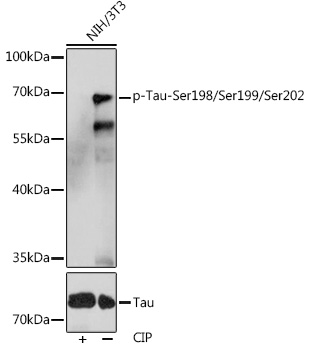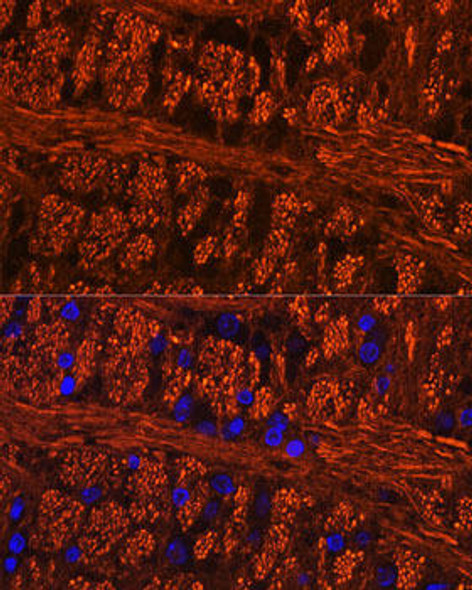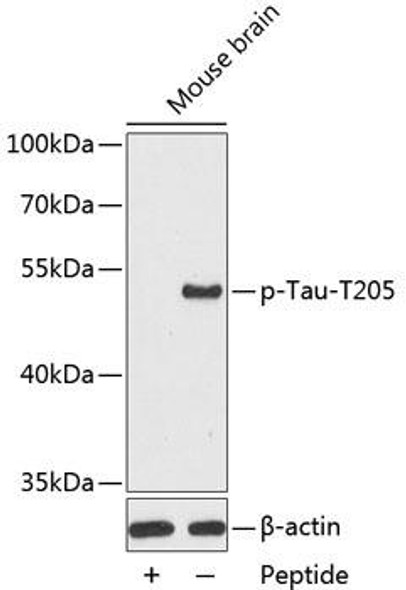Cell Biology Antibodies 14
Anti-Phospho-Tau-Ser198/Ser199/Ser202 Antibody (CABP1096)
- SKU:
- CABP1096
- Product Type:
- Antibody
- Reactivity:
- Human
- Reactivity:
- Mouse
- Reactivity:
- Rat
- Host Species:
- Rabbit
- Isotype:
- IgG
- Antibody Type:
- Polyclonal Antibody
- Research Area:
- Cell Biology
Description
| Antibody Name: | Anti-Phospho-Tau-Ser198/Ser199/Ser202 Antibody |
| Antibody SKU: | CABP1096 |
| Antibody Size: | 20uL, 50uL, 100uL |
| Application: | WB |
| Reactivity: | Human, Mouse, Rat |
| Host Species: | Rabbit |
| Immunogen: | A phospho specific peptide corresponding to residues surrounding Ser198/Ser199/Ser202 of human Tau. |
| Application: | WB |
| Recommended Dilution: | WB 1:500 - 1:2000 |
| Reactivity: | Human, Mouse, Rat |
| Positive Samples: | NIH/3T3 |
| Immunogen: | A phospho specific peptide corresponding to residues surrounding Ser198/Ser199/Ser202 of human Tau. |
| Purification Method: | Affinity purification |
| Storage Buffer: | Store at -20°C. Avoid freeze / thaw cycles. Buffer: PBS with 0.02% sodium azide, 50% glycerol, pH7.3. |
| Isotype: | IgG |
| Sequence: | Email for sequence |
| Gene ID: | 4137 |
| Uniprot: | P10636 |
| Cellular Location: | Cell membrane, Cell projection, Cytoplasm, Cytoplasmic side, Peripheral membrane protein, axon, cytoskeleton, cytosol |
| Calculated MW: | 32-45kDa/78- 80kDa |
| Observed MW: | 70kDa |
| Synonyms: | DDPAC, FTDP-17, MAPTL, MSTD, MTBT1, MTBT2, PPND, PPP1R103, TAU, MAPT, Tau |
| Background: | This gene encodes the microtubule-associated protein tau (MAPT) whose transcript undergoes complex, regulated alternative splicing, giving rise to several mRNA species. MAPT transcripts are differentially expressed in the nervous system, depending on stage of neuronal maturation and neuron type. MAPT gene mutations have been associated with several neurodegenerative disorders such as Alzheimer's disease, Pick's disease, frontotemporal dementia, cortico-basal degeneration and progressive supranuclear palsy. [provided by RefSeq, Jul 2008] |
| UniProt Protein Function: | Tau: a microtubule-associated protein that regulates microtubule assembly and stability. Apparently involved in the establishment and maintenance of neuronal polarity. Mutations can result in several neurodegenerative disorders such as Alzheimer's disease, Pick's disease, frontotemporal dementia, cortico-basal degeneration and progressive supranuclear palsy. The C-terminus binds axonal microtubules while the N-terminus binds neural plasma membrane components, suggesting that tau functions as a linker. Axonal polarity is predetermined by tau localization (in the neuronal cell) in the domain of the cell body defined by the centrosome. Nine differentially spliced isoforms have been described. The short isoforms allow plasticity of the cytoskeleton, whereas the longer isoforms may preferentially play a role in its stabilization. |
| UniProt Protein Details: | Protein type:Cytoskeletal Chromosomal Location of Human Ortholog: 17q21.1 Cellular Component: microtubule; microtubule associated complex; growth cone; axon; tubulin complex; plasma membrane; axoneme; cytosol Molecular Function:protein binding; enzyme binding; structural constituent of cytoskeleton; microtubule binding; apolipoprotein binding; protein kinase binding; SH3 domain binding Biological Process: axon extension; apoptosis; positive regulation of microtubule polymerization; positive regulation of axon extension; axon cargo transport; neuron migration; microtubule cytoskeleton organization and biogenesis; adult walking behavior; regulation of microtubule polymerization; mitochondrion transport along microtubule; negative regulation of intracellular transport; generation of neurons; regulation of autophagy; cell structure disassembly during apoptosis Disease: Supranuclear Palsy, Progressive, 1; Pick Disease Of Brain; Frontotemporal Dementia; Parkinson-dementia Syndrome; Parkinson Disease, Late-onset; Frontotemporal Lobar Degeneration With Tdp43 Inclusions, Grn-related |
| NCBI Summary: | This gene encodes the microtubule-associated protein tau (MAPT) whose transcript undergoes complex, regulated alternative splicing, giving rise to several mRNA species. MAPT transcripts are differentially expressed in the nervous system, depending on stage of neuronal maturation and neuron type. MAPT gene mutations have been associated with several neurodegenerative disorders such as Alzheimer's disease, Pick's disease, frontotemporal dementia, cortico-basal degeneration and progressive supranuclear palsy. [provided by RefSeq, Jul 2008] |
| UniProt Code: | P10636 |
| NCBI GenInfo Identifier: | 6754638 |
| NCBI Gene ID: | 4137 |
| NCBI Accession: | NP_005901 |
| UniProt Related Accession: | P10636 |
| Molecular Weight: | 46kDa |
| NCBI Full Name: | microtubule-associated protein tau isoform 2 |
| NCBI Synonym Full Names: | microtubule associated protein tau |
| NCBI Official Symbol: | MAPT |
| NCBI Official Synonym Symbols: | TAU; MSTD; PPND; DDPAC; MAPTL; MTBT1; MTBT2; FTDP-17; PPP1R103 |
| NCBI Protein Information: | microtubule-associated protein tau |
| UniProt Protein Name: | Microtubule-associated protein tau |
| UniProt Synonym Protein Names: | Neurofibrillary tangle protein; Paired helical filament-tau |
| Protein Family: | Tautomerase |
| UniProt Gene Name: | MAPT |
| UniProt Entry Name: | TAU_HUMAN |







